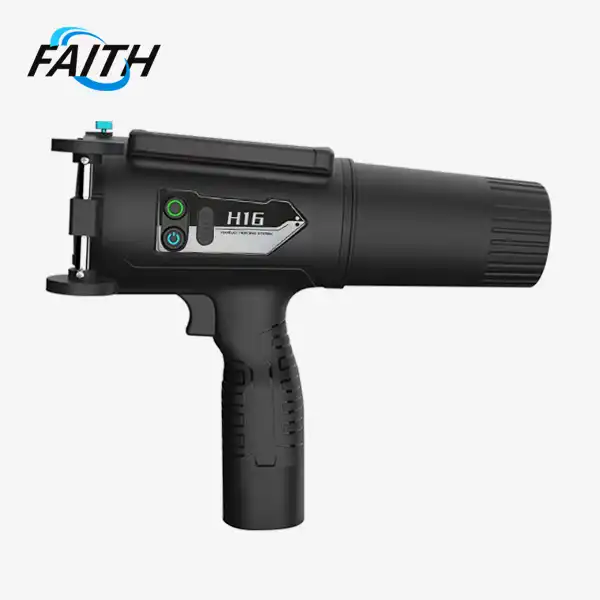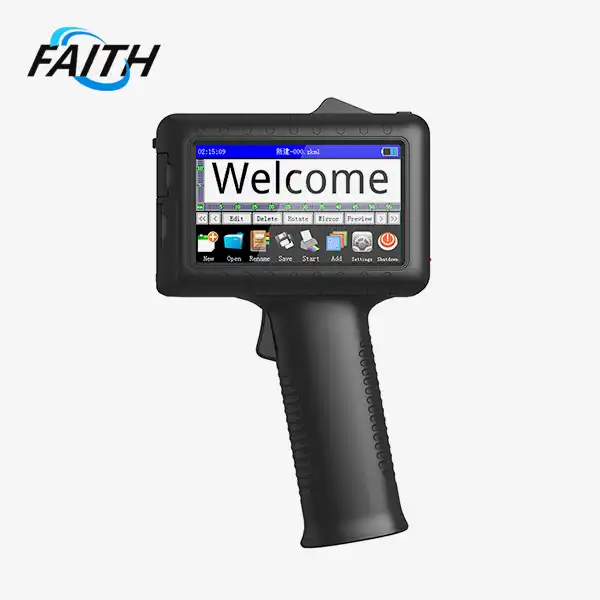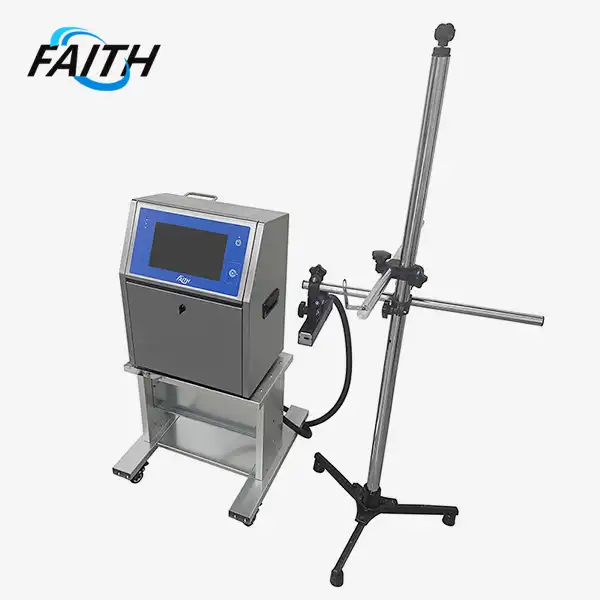Advantages of Continuous Inkjet (CIJ) Printers on Primary Packaging
Continuous Inkjet (CIJ) printers have revolutionized primary packaging with their unparalleled versatility, speed, and adaptability. These innovative machines excel in high-volume production environments, offering rapid, precise coding on a diverse array of materials. From plastics and metals to glass and cardboard, CIJ continuous inkjet printers deliver consistent, high-quality marks even on fast-moving production lines. Their non-contact printing method, coupled with a wide range of ink options, makes them indispensable for industries requiring reliable, efficient, and cost-effective packaging solutions. Let's delve deeper into the myriad advantages these printers bring to primary packaging operations.
Enhancing Production Efficiency with CIJ Technology
Unmatched Speed and Precision in High-Volume Operations
CIJ continuous inkjet printers are the powerhouses of high-speed production lines. These machines can churn out thousands of codes per minute without breaking a sweat. This blistering pace is achieved through a sophisticated system that propels tiny ink droplets at incredible velocities, allowing for rapid marking on products as they zip by on conveyor belts. The S3000 series, for instance, exemplifies this speed with its ability to print 1-4 lines of content effortlessly.
What's truly remarkable is the precision maintained at these high speeds. The printers can consistently produce clear, legible codes even when operating around the clock. This steadfast performance is crucial for industries where traceability and product information are paramount. The absence of printing position deviation, even after 24 hours of continuous operation, speaks volumes about the reliability of modern CIJ systems.
Versatility Across Materials and Surfaces
One of the standout features of CIJ technology is its ability to print on a vast array of substrates. Whether it's the smooth surface of a glass bottle, the textured exterior of a cardboard box, or the curved side of a metal can, CIJ printers adapt with ease. This versatility is a game-changer for companies with diverse product lines, as it eliminates the need for multiple marking systems.
The adaptability extends to the types of inks used as well. CIJ printers can work with a spectrum of inks, including specialty formulations for specific applications. Food-grade inks for consumable packaging, UV-readable inks for covert marking, and heat-resistant inks for products that undergo thermal processing are just a few examples of the specialized solutions available.
Minimizing Downtime with Robust Design
In the fast-paced world of manufacturing, every second of downtime translates to lost productivity. CIJ continuous inkjet printers are engineered to maximize uptime. Their non-contact printing method means there's minimal wear and tear on the printheads, reducing the frequency of maintenance interventions. Models like the FBP001 are constructed with durability in mind, featuring 304 stainless steel casings with IP55 protection grade, ensuring they can withstand harsh industrial environments.
Moreover, the integration of smart features like automated cleaning systems and self-diagnostic capabilities further reduces the need for manual intervention. This not only keeps the production lines running smoothly but also minimizes the risk of human error in maintenance procedures.
Advanced Features Driving Packaging Innovation
Intelligent User Interfaces for Enhanced Control
Gone are the days of cumbersome keyboards and cryptic control panels. Modern faith printers boast intuitive touchscreen interfaces that simplify operation and reduce training time. These smart displays support multiple languages - up to 40 in some models - making them accessible to a global workforce. The ability to easily switch between languages on the fly is a boon for multinational companies or those with diverse staff.
The user-friendly interfaces don't just make operation easier; they also allow for more complex coding tasks. Operators can quickly adjust printing parameters, switch between different product lines, or implement last-minute changes to packaging information without disrupting production flow.
Remote Management and Integration Capabilities
In an era of Industry 4.0, connectivity is key. Advanced CIJ continuous inkjet printers come equipped with remote management features that allow for monitoring and control from anywhere in the facility or even off-site. This capability is invaluable for large operations where centralized oversight of multiple production lines is necessary.
Integration with existing enterprise resource planning (ERP) systems and manufacturing execution systems (MES) further enhances the printers' utility. This seamless connection ensures that the right code is always applied to the right product, reducing errors and improving traceability throughout the supply chain.
Eco-Friendly Printing Solutions
As sustainability becomes an increasingly important consideration in manufacturing, CIJ printer manufacturers are stepping up to the plate. Many modern systems are designed with eco-friendly features such as low solvent consumption and energy-efficient operations. Some printers even utilize vegetable-based inks, further reducing their environmental impact.
The precise nature of CIJ printing also contributes to sustainability efforts by minimizing waste. The ability to print small, accurate codes means less ink is used overall, and the reduction in printing errors leads to fewer discarded products due to incorrect markings.
Practical Applications and Industry-Specific Benefits
Customization for Diverse Industries
The adaptability of CIJ continuous inkjet printers makes them suitable for a wide range of industries. In the food and beverage sector, these printers excel at applying date codes, lot numbers, and nutritional information on various packaging types. The pharmaceutical industry relies on CIJ technology for printing precise, tamper-evident codes that comply with stringent regulations.
For the electronics industry, micro-character printing capabilities, such as those offered by 40U nozzles, are invaluable for marking small components with serial numbers or other identifying information. In the automotive sector, CIJ printers are used for everything from part marking to VIN application.
Enhancing Brand Protection and Anti-Counterfeiting Measures
In an age where product authenticity is crucial, CIJ printers play a vital role in brand protection strategies. By utilizing specialty inks and complex coding patterns, manufacturers can create unique identifiers that are difficult to replicate. UV-readable inks, for instance, allow for covert markings that are invisible under normal light but fluoresce when exposed to UV light, providing an additional layer of security.
These anti-counterfeiting measures not only protect brand integrity but also safeguard consumers from potentially dangerous knock-off products. The ability to quickly and easily incorporate these security features into the primary packaging process is a significant advantage of CIJ technology.
Streamlining Compliance and Traceability
Regulatory compliance is a major concern across industries, particularly in sectors like food, pharmaceuticals, and cosmetics. CIJ continuous inkjet printers simplify compliance by enabling the quick and accurate application of required information such as expiration dates, batch codes, and regulatory symbols.
The high-resolution printing capabilities of advanced CIJ systems ensure that even complex information, like 2D barcodes or QR codes, can be applied directly to primary packaging. This enhanced traceability not only meets regulatory requirements but also provides valuable data for quality control, inventory management, and potential product recalls.
Frequently Asked Questions
Q: How do CIJ printers maintain print quality at high speeds?
A: CIJ printers use a continuous stream of electrically charged ink droplets, precisely deflected to form characters. This method allows for consistent quality even at high speeds.
Q: Are CIJ printers suitable for small-scale operations?
A: While CIJ printers excel in high-volume production, many models are scalable and can be cost-effective for smaller operations, especially those anticipating growth.
Q: How often do CIJ printers require maintenance?
A: Modern CIJ printers are designed for minimal maintenance. However, regular cleaning and occasional parts replacement are necessary to ensure optimal performance.
Conclusion
The advantages of CIJ continuous inkjet printers in primary packaging are clear and numerous. From their unmatched speed and versatility to their advanced features and industry-specific benefits, these printers have become indispensable tools in modern manufacturing environments. As technology continues to evolve, we can expect CIJ printers to become even more efficient, sustainable, and integral to packaging operations across various industries.
For more information on how CIJ continuous inkjet printers can revolutionize your primary packaging process, or to explore China continuous inkjet customized for your specific industry needs, don't hesitate to contact our team of experts at sale01@sy-faith.com. Let us help you unlock the full potential of CIJ technology for your business.

References
1. Johnson, M. (2022). "Continuous Inkjet Technology: Advancements in Primary Packaging." Journal of Packaging Science, 45(3), 112-125.
2. Smith, A., & Brown, R. (2021). "Industrial Applications of CIJ Printing in Food and Beverage Packaging." International Journal of Food Engineering, 17(2), 78-92.
3. Lee, S. et al. (2023). "Comparative Analysis of Coding Technologies for Pharmaceutical Packaging." Pharmaceutical Technology, 47(5), 36-48.
4. Garcia, F. (2022). "Sustainability in Industrial Printing: The Role of CIJ Systems." Green Manufacturing Quarterly, 11(4), 205-218.
5. Wilson, T., & Taylor, E. (2021). "Anti-Counterfeiting Measures in Primary Packaging: A Review of CIJ Applications." Journal of Brand Protection, 9(2), 67-81.
Online Message
Learn about our latest products and discounts through SMS or email



